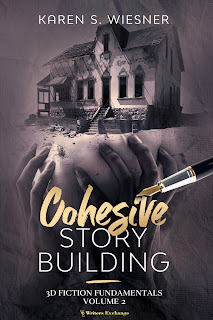Writer's Craft Article
Fiction Fundamentals: Writing
Elbow Grease, Part 5D
General Revision Choices, concluded
by Karen S. Wiesner
Based on Cohesive Story Building, Volume 2: 3D Fiction Fundamentals Collection

In this three month, in-depth series, we're going to go over what could be considered the grunge work in building a cohesive story. Revising, editing, and polishing require a little or a lot of writing elbow grease to finish the job and bring forth a strong and beautiful book.
In the previous part of this series, we went over general revision choices. Let's finish that.
Tip Sheet: Effective Revision Choices
• Don't make me repeat myself--avoid careless repetition. Watch for repeated words. If you have a noun or verb in the first paragraph of a page, then that same word again at the end of the same page, it literally jumps out at the reader. The same can be true if you repeat a word for no other reason except that you couldn't think of a better, similar, more effective one. Look carefully at the first paragraph in the example below, rife with repetition that jumps out with its overuse, then notice the differences in the published version:
It was
daylight. Mortal time of day, not his, and I felt the need to see what the men
had done to his once beautiful home, to see if I could indeed walk the
exorcized grounds or sleep in the wooden boxes defiled by holy hosts and holy
water.
I
searched the wall until I found a low wooden door hanging partway open, open
enough that I could squeeze my body through.
On the
opposite side, the once beautiful gardens were overgrown with weeds and scrubby
bushes. The abbey church that had undoubtedly once been beautiful was overgrown
with scrubby bushes and weeds that surrounded the vaulted stone frames empty of
their holy glass.
What
had happened to the holy order that had once lived here? Did their ghosts still
walk these quiet grounds, broken, desolate souls among broken dreams?
Did the vampire's soul walk with their broken, desolate souls?
***
It was
daylight. Mortal time, not his, and I felt the need to see what the men had
done to his home, to see if I could indeed walk the exorcized grounds or sleep
in the boxes defiled by hosts and holy water.
I
searched the wall until I found a low wooden door hanging partway open, enough
that I could squeeze my body through.
On the
opposite side, the once beautiful gardens were overgrown with weeds and scrubby
bushes. The abbey church that had undoubtedly once been beautiful was covered
with dead ivy that surrounded the vaulted stone frames empty of their holy
glass.
What
had happened to the order that had once lived here? Did their ghosts still walk
these quiet grounds, desolate souls among broken dreams?
Did
the vampire's soul walk with theirs?
--Mina, by Marie Kiraly
Fixing this kind of problem is an editing and polishing job that really requires a lot of uninterrupted focus.
• Then again, all repetition isn't bad. Save repetition for places where it drives the impact deeper in, rather than annoying the reader or calling attention to your words:
Nothing
was enough. Sitting still wasn't enough. Getting his hands on her wasn't
enough. He wanted to devour her whole.
--Falling Star, by Karen Wiesner
• A thesaurus is not always a writer's best friend. Another thing I feel I must mention is that newer writers tend to overuse their thesaurus. While variety is good, you don't want to sound like you've been using a thesaurus. For instance, in this sentence, I've clearly used my thesaurus way too often:
The
redolent perfume of gingerbread accosted her the moment she strode into her
ignoble tenement.
"Ah! The redolent perfume of gingerbread accosted me the moment I strode into your ignoble tenement."
As with all guidelines, none of these suggestions are hard and fast rules. You'll know it's written the way it's meant to be when it won't be cut, replaced, or reworked in any other way. Only then will your editing and polishing be complete.
Next week, we'll conclude this series on the grunge work involved in completing a story.
Happy writing!
Karen S. Wiesner is the
author of Cohesive Story Building, Volume
2 of the 3D Fiction Fundamentals Collection
http://www.writers-exchange.com/3d-fiction-fundamentals-series/
https://karenwiesner.weebly.com/writing-reference-titles.html
Karen
Wiesner is an award-winning,
multi-genre author of over 150 titles and 16 series.






































